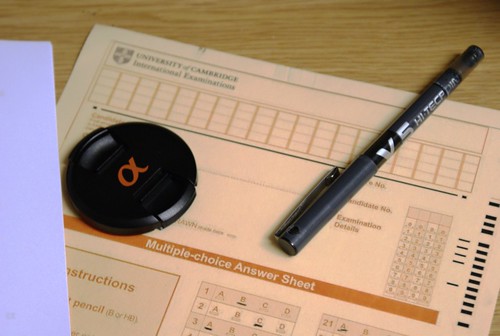This post is a comment that will be published in an upcoming article on 21st century skills and assessment in The Language Educator, the bimonthly publication of the American Council on the Teaching of Foreign Languages.
Multiple choice was the death of critical thinking.
Multiple choice questions train students to look at problems in one of two ways:
- what is the “right” answer?
- what is the answer the test writer wants from me?
Neither develops critical skills, and neither prepares students to be helpful, productive, thinking adults in the 21st Century. People who continue this thinking into their adulthood cannot approach a problem and really solve it; they can only repeat sound bytes and avoid compromise.
When we are doing specific test-preparation exercises in AP class, I give my students tips to get the “right” answer on the test. They are ridiculous statements I’d never make in any other situation, including:
- They want you to be a good green citizen. What answer shows that?
- They want you to sympathize with whomever they perceive as an oppressed population.
- They’re trying to cast this type of art in a very positive light. Which answer is most positive?
- They want to see how multicultural you can be.
The rest of the time, the majority of the time, when we are not “preparing” for the test (and in my other classes), we ask real questions. Real questions do not usually have one right answer. Real questions elicit creative thought and problem-solving. We ask questions that start with why and how and other thought-inspiring words.
- Why is it important to preserve the Amazon?
- Against whom is this government policy biased? How would you change it to be more fair?
- What would you be willing to give up to change our tourism industry the way this country is trying to do it?
- Would you want the government to intervene to rescue a kidnapped family member? How far would you want them to go and why?
- What could these students do if they had access to the technology you do?
Something I often say is, “If the answer to a question is ‘who cares?’ then the question was not worth asking. But if the answer to a question is ‘I don’t know, but I care’- then we’ll actually learn something.”
Too often, the answer to a multiple choice question is, “Who cares?”
Foto credit: Ben Jeffrey
3 Comments
Comments are closed.





Tell that to SAT testers, let me know what they say. I’d be interested!
[…] and practical intelligence instead, and take a multi-directional approach to learning (spoiler, the multiple choice test isn’t […]
[…] close to a real picture of learner ability as we can come. No trick questions, no extra credit, no multiple choice, no extra-subject categories (i.e. art criteria in a language […]